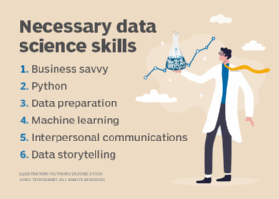
peshkova - Fotolia
Data scientist job outlook in post-pandemic world
There was a lull in hiring for one of the hottest jobs in the U.S., but as lockdowns start to lift and offices start to reopen, the data scientist job outlook is changing.
The data scientist job outlook remains positive despite a year of challenges.
Indeed's Hiring Lab found that technology job postings were negatively affected by the pandemic. On top of the decline, the technology sector has had a lackluster recovery.
But the data scientist job outlook for remains bright in a post-pandemic world. There are signs of a strong recovery and increase in the value of data science jobs and the overall tech job market.
According to Glassdoor's 50 Best Jobs in America for 2020, data scientist remains one of the top three positions in the U.S., with a high job satisfaction and median base salary over $100,000. And despite a decline in position postings, becoming a data scientist remains as desirable as it was at pre-pandemic levels.
Data scientists still growing
The dramatic job posting decrease doesn't paint the whole picture. The value of data literacy and analytical capacity has not decreased, rather the ability for organizations to hire these high-value positions has declined.
"There are no signs that they're going to be less in demand," said Frank Buytendijk, analyst at Gartner. "The number of chief data officers is still increasing."
When the pandemic first started, many organizations went into a hiring freeze while the length of lockdowns was unknown. According to Nancy Darian, data science and analytics recruiter at Smith Hanley Associates, data scientist hiring dipped with the 2020 recession. The need for data scientists didn't diminish, but new hires for the role have only just started to pick up. "I would say we're coming out of the depths of the pandemic crisis," she said.
In February, hiring started to pick up with slight increases every month since, according to Darian. And even when data scientist hiring was low, the need was still high.
"Companies got the most out of whoever they already had on staff, but there was not a lot of hiring going on," she said.
The need for data scientists
Organizations are still relatively data illiterate, and data analytics remains a relatively young industry. As data science and analytics continue to grow, acquiring and retaining experienced and knowledgeable employees is important.

"Data science in a business context goes beyond merely doing research and statistics with data provided to you, as it requires the person to understand the full data pipeline," said Steve Tycast, director of data and analytics at AIM Consulting Group.
In his observations at Gartner, Buytendijk has seen that job postings have added more and more analytical requirements. Successful organizations look to combine skills for data analysis and management. And enterprises ideally hope this combination can come from a small core.
Darian said over the last few years, data science has become a candidate market. The hype around a shortage of data scientists has led to a popularity in bootcamps and data science university offerings. But regardless of the large candidate pool, the data science job outlook is better for more highly trained and experienced data scientists.
"There are so many graduate trainees and programs, however, experienced and really good people are hard to come by," Darian said.
Data scientists and data science teams
The pandemic forced organizations to rethink hiring data scientists. Instead of putting significant funds toward an individual, organizations have sought to build better data science teams.
There is a set of skills companies look for when they build their data science team. There must be individuals with business skills and those capable of understanding what your data can be used for and how it can improve business operations. Accompanying them, you need team members with quantitative skills -- those who can understand the models and their limitations. There also must be people on the team with certain technological skills who are capable of handling data management.
"You put people with different skill sets and different assets together in order to create the entity," Buytendijk said. "And the chances that one person is an expert in all three are pretty small, so you try to pull together small teams of people that have crossover skills."
For organizations unable or hesitant to commit resources to data science positions, it is necessary to look to multiple hires to solve the overarching problem of gathering, handling and applying data through analytics and machine learning.
Data scientists are often supposed to be the combination of all three and are difficult to find and keep. Their combination of skills and enterprise reliance on data relates to their increased popularity and demand.
"An exceptional candidate has the ability to think critically, demonstrating that they fully understand the business problem and have the ability to walk me through the steps in creating the solution," Tycast said. "It is not just technically delivering a result but showing the successes and failures using various variables and algorithms to derive the best answer."
Continued learning is necessary for a positive data scientist job outlook on an individual level. Darian said bootcamp and Coursera class enrollment has been trending in the last few years as necessary skills have evolved.
"There's definitely been a big pickup in these kinds of courses," she said.
Retention
While the data science job outlook is strong, it can be a struggle for organizations to keep such high-demand employees. Salaries are competitive and demand is high, so it is more important than ever that your data scientists and analysts are incentivized to stay.
"Employers want to be competitive, but it's not a 'sky's the limit' type of thing," Darian said. "[Data scientists] are well paid, and they expect to be well paid."
Buytendijk has seen two effective strategies for retention in data scientist jobs. The first is to offer employees a lot of training. Data scientists have a natural curiosity and a strong desire to continue learning.
Offering continued learning opportunities is important, especially if the position isn't inherently challenging for the employee. Buytendijk also said giving data scientists more responsibility and the ability to interact with business executives helps with retention.
This is a sign of the times in the data science field. Incorporation and interaction between the data analytics part of the organization and C-level executives has become a popular trend as enterprise reliance on data has increased. And to reflect this dynamic change, organizations should keep both pillars abreast of one another's operations. Data scientists have become a significant part of the data-focused enterprise and providing these employees with reasonable responsibility and C-level communication only makes sense.






